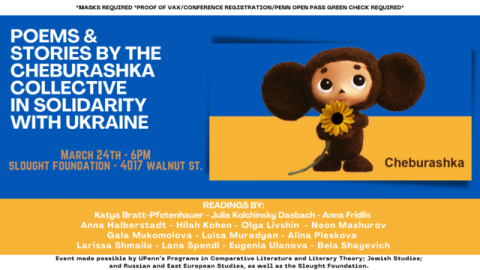
Slought is pleased to announce Poems & Stories by the Cheburashka Collective, on Thursday, March 24, 2022 from 6-8pm. The event will take place in the Slought galleries and will feature a reading of original works by a growing collective of women & nonbinary writers who are emigres/refugees/first-generation from countries that were once a part of the Eastern bloc. The poets, translators, and writers featured in this event—including Katya Bratt-Pfotenhauer, Julia Kolchinsky Dasbach, Anna Fridlis, Anna Halberstadt, Hilah Kohen, Olga Livshin, Neon Mashurov, Gala Mukomolova, Luisa Muradyan, Alina Pleskova, Bela Shayevich, Larissa Shmailo, and Lana Spendl—will each share a piece of their work, followed by a moderated conversation with the audience.
Please note that masks and proof of vaccination are required to attend this event.
https://slought.org/resources/cheburashka_collective
While this event was organized before the most recent invasion of Ukraine and readers will share work across a range of themes, not necessarily responding to the current crisis, its devastation now casts a long shadow over this gathering of voices. As such, this evening of literature, poetry, and art can become an opportunity to think about the devastation that is not only taking place but has taken place over a much longer period of time, and not only in Ukraine. The recent events bring our awareness to the long histories of dispossession and displacement that have resulted from the ambitions of global capitalism, the projects of colonialism and imperialism, the violence of different forms of liberalism, and the forces of fascism that are presently growing around the globe. In the face of these devastating histories, literature, poetry, and art are perhaps our most enduring resource for processing, coping, and surviving trauma. Join us in choosing, in daring, albeit briefly, to be in this lyric moment of hope—a hope that reflection might help us find ways to combat these forces of dispossession and displacement in the name of a different future.
The Cheburashka Collective is named for the iconic Soviet-era cartoon character, Cheburashka, an unusual creature of unknown origin who arrives as a stowaway in a crate of oranges. Cheburashka is rejected by the zoo, which doesn't know how to categorize them, and goes searching for where, and with whom, they belong. For members of the collective and many immigrants/refugees from the former Soviet Union, Cheburashka symbolizes displacement, curiosity, otherness, and complicated assertions of selfhood and identity. Members of the collective write from, about, through, and sometimes even away from their unique identities.
Location: 4017 Walnut St.
Co-sponsors: Comparative Literature and Literary Theory Program; Jewish Studies; Russian and East European Studies
Organizers: Julia Kolchinsky Dasbach, Alina Pleskova
Open to the public